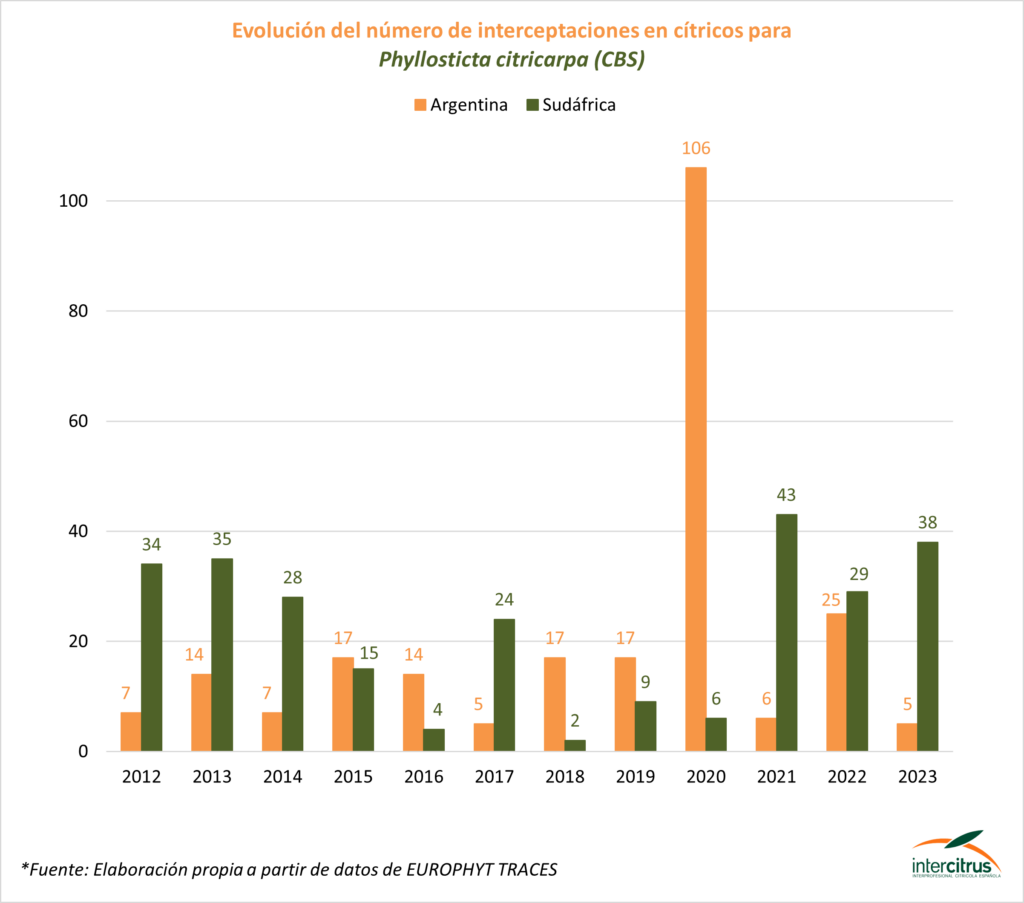- Given this country’s non-compliance with the cold treatment against the ‘False Codling Moth’ and the record interceptions for Citrus Black Spot (CBS), Intercitrus reiterates in a letter to the European Commission (EC) the immediate cessation of imports and calls for automatic closure after 5 rejections, as previously proposed temporarily.
- The interprofessional once again questions in the letter the “cosmetic” measure adopted by South African operators to suspend shipments from September 15th, not only because it is the seventh time in 11 years that they have done so, or because in practice, exports continue to the EU from later areas, but also because this year the greatest number of problems are occurring with lemons, not oranges.
- The four imported shipments (3 from South Africa and 1 from Israel) detected this year until September with T. leucotreta in tangerines and grapefruits once again prove that they can also be hosts of the pest, which should compel the EU to extend cold treatment to these two citrus species.
Intercitrus already warned the European Commission (EC) in a letter on October 3rd that South Africa was on track to reach “record interception figures” in European ports for citrus affected by pests or diseases regulated as ‘priority’ by the EU, such as Citrus Black Spot (CBS). This was before the official data published today by the Europhyt-Traces portal, which reports that the 33 rejections caused by this reason until August would need to be supplemented by the 5 confirmed rejections, also due to CBS, in September or those caused in South African tangerines by T.leucotreta. This total (38 until September) is already the second-highest in South Africa’s history regarding this dangerous fungus, but most likely will be the highest when the results of inspections for the remainder of the campaign in the southern country (October and November) are counted. In fact, last year, under similar circumstances to the current ones, there were up to 19 interceptions of this disease in citrus from this origin during those two months. Only Argentina, in 2020, exceeded these figures, and in that season, the EC ordered the banning of exports from that origin for this reason, which has since significantly improved their control. “The European executive is aware of all this and must react immediately. It is obvious that the South Africans are not capable of keeping Citrus Black Spot at bay, and we also have certainty that they are not complying with the cold treatment against the False Codling Moth approved in 2022. Therefore, given the evident phytosanitary risk, we have formally demanded the immediate cessation of South African citrus imports, and for the future, regulation that after accumulating 5 interceptions of CBS, the EU can unilaterally suspend them,” warned the president of the interprofessional, Inmaculada Sanfeliu.
Intercitrus already denounced last month and has again transmitted by letter to the commissioners with competencies in this matter – Stella Kyriakides from the Directorate-General for Health and Food Safety; Janusz Wojciechowski (Agriculture) and Valdis Dombrovskis (Trade) – that the measure adopted by South African exporters was a mere “cosmetic operation” aimed at avoiding the unilateral closure of the EU for all its citrus. The citrus organization refers to the suspension, from September 15th, of issuing phytosanitary certificates at the source necessary for exports to the EU. A partial decision, which only affects oranges produced in areas declared affected by Citrus Black Spot (those in the Eastern Cape) and not the rest of citrus fruits – mandarins, lemons, or grapefruits – which can equally carry spores since they are affected by the aforementioned fungus (which causes spots and necrotic lesions on fruits, rendering them unsuitable for fresh commercialization). “This is a measure that benefits them in terms of public opinion but does not represent any effort for them. Because the areas where it is declared and where export to the EU ceases are where early and mid-season oranges are predominantly produced, which – as of September 15th – the campaign had practically already ended for them, and because the oranges that are being loaded at a later date will continue to arrive from later areas until October,” explains the letter.
As anticipated, it is not the first time that South Africa has taken a similar decision. In the last eleven years – and as recalled in the letter – it has done so on seven occasions. In almost all of those years, and as proof of the ineffectiveness of the measure, EU inspectors detected CBS on dates after the suspension promoted by the CGA. This year, there is one more differentiating factor that would rule out the phytosanitary motivation of this decision: in 2021 and 2022, there were more interceptions in oranges than in any other citrus, but in 2023, this has not been the case, and during these months, there have been many more rejections for CBS in lemons (14) than in oranges (11).
specific measures to systematically verify their compliance in each shipment. In addition to this, confirmed detections for this same pest in tangerines and grapefruits from South Africa (3) as well as from Israel (1) this year, according to the interprofessional, would justify the need to extend cold treatment to all species that, like those mentioned, are accredited as hosts of larvae of this insect. On the other hand, emphasis is placed on the “alarming news of the detection of the Diaphorina Citri insect in Cyprus, in EU territory, as it is the transmitting the most dangerous vector of HLB, because it transmits the Asian variant (considered the most devastating citrus disease and for which there is no known cure), it adapts better to the Mediterranean climate (due to its tolerance to a wider range of temperatures than other transmitting vectors such as Trioza Erytreae), it is more difficult to detect, and it develops very favourably in the Citrange carrizo citrus rootstock, which is mostly used in the Mediterranean.”

